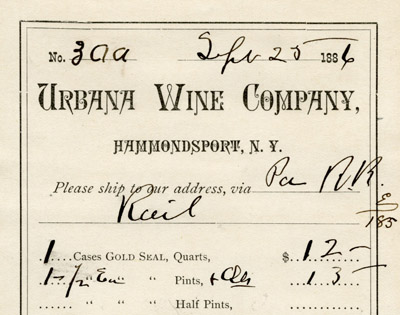Urbana Wine Company Records

Founded by John W. Davis, H.H. Cook, A.J. Startzer and others in 1865, the Urbana Wine Company was among the earliest and most successful wineries in the Finger Lakes region of New York. Organized in Hammondsport, N.Y., the center of the eastern wine industry, Urbana’s claim to fame was its widely popular Gold Seal Champagne and other sparkling wines and along with Walter Taylor, they dominated regional wine production during the Gilded Age. The winery survived passage of Prohibition in 1919 , both World Wars operating under the Gold Seal label, but was closed by its parent company, Seagrams, in 1984.
The Urbana Records are concentrated in the period 1881-1885, as the company was growing rapidly. Among other materials, the collection includes a range of correspondence, receipts, some financial records, and tallies of grapes. Additional material on the company is located in Cornell University’s Eastern Wine and Grape Archive.

